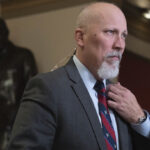One of America’s leading historians and constitutional experts has divulged four major arguments proving that the recent ruling against a Christian florist was wrong – a decision that penalized the business owner for declining to provide service for a homosexual couple’s wedding.
WallBuilders Founder and President David Barton goes back to the basics – from the time of America’s Founding Fathers – to explain why the highest court in Washington state was dead wrong in its ruling against florist owner Barronelle Stutzman for acting according to her sincerely held Christian beliefs by not providing floral arrangements for a same-sex wedding … and therefore supporting the LGBT agenda.
Unconstitutional and uncalled for …
Barton’s case appeals to the United States Constitution by posing a simple question:
“What is America’s first-protected, most-important and longest-cherished politically protected right?” the leader of the pro-family organization asked. “The answer? … The right of religious conscience.”
He sees the ruling against Stutzman as flying in the face of this protection guaranteed to every American citizen.
“But the Supreme Court of Washington state just became another in the line of recent courts that know nothing of – or don’t care – about this inalienable right,” Barton contended in his column on WND. “The early colonists arriving in America came largely seeking this right. In Europe, the governments consistently told them how to practice their faith, and they punished them if they did not do what the government wanted. But the religious-minded colonists believed no one but God could tell them how to practice their faith.”
He backed up his argument by re-visiting America during colonial times, when the Europeans fled west across the Atlantic Ocean thousands of miles to escape persecution and live in a land where they were free to worship God and exercise their Christian beliefs without fear and punishment.
“The Pilgrims journeyed to America in 1620 to escape the hounding government persecution in England, as did 20,000 Puritans in the 1630s,” Barton informed. “In 1632, government-persecuted Catholics fled to America; in 1654, persecuted Jews from Portugal; in 1680, persecuted Quakers arrived here, as did persecuted Anabaptists from Germany in 1683, 400,000 persecuted Protestants from France in 1685; and so forth. These settlers, having been punished for exercising their rights of religious conscience, promptly enshrined these rights in their own governing documents, including Rhode Island in 1640, Maryland in 1649, Jersey in 1664, Carolina in 1665, Pennsylvania in 1682, and so forth. As John Quincy Adams affirmed, ‘The transcendent and overruling principle of the first settlers of New England was conscience.’”
He then fast-forwarded nearly 100 years – when the United States was formed – to strengthen his case.
“In 1776, when America separated from Great Britain, the rights of religious conscience were once again promptly preserved in the new state constitutions and then in the federal Constitution,” the best-selling author asserted. “According to the Founding Fathers, this was one of the most important rights they protected.”
Appealing to the timeless experts …
Barton followed up by quoting one of the most celebrated Founding Fathers:
“No provision in our Constitution ought to be dearer to man than that which protects the rights of conscience,” Barton quoted former U.S. President Thomas Jefferson. “[O]ur rulers can have no authority over such natural rights only as we have submitted to them. The rights of conscience we never submitted … It is inconsistent with the spirit of our laws and Constitution to force tender consciences.”
The consultant to federal and state legislators then appealed to a statement made by one of the signers of the U.S. Constitution.
“Government is instituted to protect property of every sort,” Barton wrote, repeating the very words of James Madison. “Conscience is the most sacred of all property.”
He then restated the words of one of the authors of the Federalist Papers.
“The rights of conscience and private judgment … are by nature subject to no control but that of Deity, and in that free situation they are now left,” Barton quoted the original U.S. Supreme Court Chief Justice John Jay.
Statements from yet another signer of the U.S. Constitution were then used by the pro-family leader.
“Consciences of men are not the objects of human legislation,” William Livingston argued, according to Barton. “The state [does not] have any concern in the matter. For in what manner doth it affect society … in what outward form we think it best to pay our adoration to God?”
Modern-day examples of protected religious convictions
Barton went on to list numerous examples of legal religious exemptions afforded to different religious and philosophical groups in America, whose beliefs and consciences give them permission to not participate in various traditional practices in the U.S.
“Jehovah’s Witnesses are not required to say the Pledge of Allegiance in public schools,” Barton pointed out.
Special allowances are also given in the school system because of religious beliefs.
“The Amish are not required to complete the standard 12 years of education,” the Christian historian asserted.
Even standard medical procedures can currently be bypassed to accommodate religious convictions.
“Christian Scientists are not forced to have their children vaccinated or undergo medical procedures often required by state laws,” Barton continued.
Special privileges are also given in the workplace, based on one’s religious beliefs.
“Seventh-Day Adventists cannot be penalized for refusing to work on Saturday,” the pro-family advocate affirmed.
Barton then stressed that special accommodations are even given to people of no religious affiliation at all – based on a mere philosophical point of view …
“Conscientious objectors are not forced to fight in wars,” he asserted, insisting that these kinds of allowances are just the tip of the iceberg.
Same-sex ‘marriage’ straight-arming Christians
Barton maintains that religious protections are not just a federal affair.
“It was because the rights of religious conscience were so important that they were specifically protected in the constitutions of the individual states – such as that of Washington,” the expert on the Constitution stressed.
He then provided a direct quote from the Washington state constitution:
“Absolute freedom of conscience in all matters of religious sentiment, belief and worship shall be guaranteed to every individual; and no one shall be molested or disturbed in person or property on account of religion …” Barton recited from the Evergreen State’s constitution.
The acclaimed researcher noted how the renegade judges in the Pacific Northwest unanimously pledged allegiance to the homosexual agenda, using so-called nondiscrimination policies to justify overriding the constitutional rights of religious adherents.
“But despite the clarity of this clause, we now get word that the Washington Supreme Court has ruled that Barronelle Stutzman, a devout and pious Christian florist [could not follow her religious convictions according to state law,” Barton added.
The conservative lecturer went on to read off part of the state supreme court judges’ ruling that explained the reasoning behind their decision.
“[Stutzman] was bound by state law to use her artistic talents to design floral arrangements to celebrate what she viewed as an immoral event – a gay wedding,” the judges declared in their ruling against the Christian florist. “The pretext for overriding the florist’s rights to free speech and religious liberty was Washington’s so-called ‘public accommodations law,’ which required the owner, Barronelle Stutzman, to provide goods and services to customers ‘regardless’ of their sexual orientation.”
Case and four points …
Barton listed off four major reasons why the judges were consummately wrong in their ruling.
- First, Barronelle has been economically fined and governmentally coerced to use her talents and skills in a way that violates her sincerely held religious beliefs.
- Second, the explicit wording of the Washington state constitution has been completely ignored by the Washington State Supreme Court. In essence, a Washington state court has deemed the Washington state constitution to be unconstitutional, just because it doesn’t want to uphold its provisions.
- Third, the court elevated a state law –its “public accommodations law” – above the state constitution; but constitutions always trump statutory laws – always.
- Fourth, John Adams described ours as “a government of laws and not of men,” but decisions like this make us just the opposite: The personal predilections of judges are now routinely placed above constitutional provisions duly enacted by the people.
The devout Christian scholar lamented at how the American government – including its justice system – has fallen from the basic principles upon which the country was established – ones that made the nation great in the first place.
“Two centuries ago, Thomas Jefferson rejoiced that ‘the comparison of our government with those of Europe are like a comparison of heaven and hell,’ but this happy distinction is now disappearing,” Barton concluded. “Because of this ruling – and dozens more like it in recent years – America is becoming more and more like the tyrannical governments of Europe that millions of early colonists fled to be free from the government persecution of their inalienable rights of religious conscience.”
—-
Copyright American Family News. Reprinted with permission.


















Recent Comments